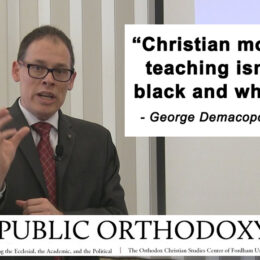 by Jordan Ballor –
by Jordan Ballor –
One of the complaints often rendered against the market economy is that it encourages selfish behavior. This picture of the marketplace is that of a kind of war of all against all, with each participant out only to maximize his or her own individual benefit. As American social gospel advocate Walter Rauschenbusch contended in his Christianizing the Social Order, “The trader has always been the outstanding case of the man who plays his own hand and sacrifices social solidarity for private gain.” This characteristic, claimed Rauschenbusch, has been exaggerated in the modern era, such that “the trading class has become the ruling class, and consequently the selfishness of trade has been exalted to the dignity of an ethical principle. Every man is taught to seek his own advantage, and then we wonder that there is so little public spirit.”
There are a number of reasons that this simplistic depiction of the motivation and practice of market participants is problematic. The features of the market economy actually require those who would selfishly seek their own narrow interests to orient their activity to the good of others. As the economist Walter Williams puts it succinctly, “In a free market, you get more for yourself by serving your fellow man. You don’t have to care about him, just serve him.” Even Adam Smith, who codified the recognition of this truth into economic theory, realized that benevolence was morally superior to selfishness, but he also saw that the sharp edges of selfishness are typically blunted through market interactions. The incentives that underlie the possibility of mutually beneficial exchange also tend to align interests rather than simply to bring them into conflict.
But beyond the level of structural incentive, it is also the case that market actors are typically oriented towards the good of others in another, even more fundamental way. If you were to inquire of people why they get out of bed to go to work every day, high up on the list of answers would be something like this: “To provide for my family.” In this way the economic sphere is not a realm of disconnected individuals whose hearts are curved in upon their own individual interests. Instead, the market is a meeting place of those who come to serve others through work in order that they might provide for the good of those to whom they are intimately bound.
The marketplace is in reality, rather than in abstract theory, a place where this sacrificial love of neighbor is realized, a love which is in no way inconsistent with self-interest, rightly understood.
In a very real sense, then, when we act in the marketplace we are not acting as abstracted individuals, but rather as human persons embedded in a deep social and moral reality. We act in our callings as representatives of the interests of others. The father sacrifices a day in which he otherwise might seek his own limited good to head to the assembly line so that he might bring home a paycheck to provide for his family: to put a roof over their heads, food on the table, and clothes on their backs. A mother takes an extra shift at the hospital so that she might be able to get something special for her child this Christmas. These kinds of sacrifices are so common and so familiar that we often forget just how remarkable they are. Families all over the world make significant sacrifices every day in the time and effort that parents (and sometimes children) expend in the marketplace.
This more complex and realistic vision of economic life is what inspired the Dutch theologian Herman Bavinck when he wrote that the “moral calling of work does not hover above us in the air and is no abstract theory, but lies embedded in life itself, in the family. Through the family God motivates us to work, inspiring, encouraging, and empowering us to work. Through this labor he equips us to survive not for the sake of satisfying our lusts but for the sake of providing for our family before God and with honor, and also to extend the hand of Christian compassion to the poor.”
It is morally significant, then, how we define our interests and where we place our happiness. As the economist Paul Heyne noted, “While self-love or self-interest is certainly capable of producing selfish behavior, it need not do so.” Instead, said Heyne, “self-interest is not the same as selfishness, and the narrow pursuit of private purposes has no necessary connection with greed, materialism, or a lack of concern for others.” We might, in this way, choose to align our economic interests with those of our families, our churches, and those who are materially impoverished. The marketplace is in reality, rather than in abstract theory, a place where this sacrificial love of neighbor is realized, a love which is in no way inconsistent with self-interest, rightly understood.
HT: Acton Institute



